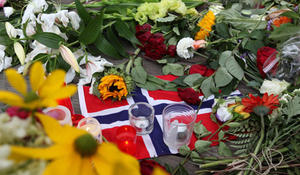ASIS International 2011Security analyst: Oslo-type attack in U.S. likely in next few years
An expert on American-Muslims fears that with the rising anti-Islamic sentiments in the United States an “Oslo-type” attack could occur in the next few years at a U.S. mosque; speaking on a panel on security threats facing faith based organizations at the ASIS 2011 security conference, Nawar Shora, the CEO of Shams Training and Development, said, “I fear that in the next few years we’ll have something like Oslo repeated here in this country, whether someone will go to an Islamic center or whether someone will try a massacre during a worship on Friday”

Impromptu shrine at site of Breivik's attaks // Source: wordpress.com
An expert on American-Muslims fears that with the rising anti-Islamic sentiments in the United States an “Oslo-type” attack could occur in the next few years at a U.S. mosque.
Speaking on a panel on security threats facing faith based organizations at the ASIS 2011 security conference, Nawar Shora, the CEO of Shams Training and Development and the author of “The Arab-American Handbook,” said, “I fear that in the next few years we’ll have something like Oslo repeated here in this country, whether someone will go to an Islamic center or whether someone will try a massacre during a worship on Friday.”
Shora noted that prior to 9/11, the Muslim community rarely experienced vandalism or security threats at mosques, community centers, or places of worship, but after the 9/11 attacks hate crimes and anti-Islamic sentiments skyrocketed around the country.
The number of reported incidents eventually leveled off, but Shora and other Muslims fear that the most recent rash of anti-Islamic incidents could be the worst yet.
“More so than immediately after 9/11, the brewing Islamophobia today seems to be at an all-time high,” Shora said.
According to the Council on American-Islamic Relations (CAIR), the number of reported civil rights complaints from the Muslim community has steadily risen since 9/11, but in 2008, complaints fell 14 percent for the second year in a row.
At the time the group stated, “Observing a second year’s decline in reported hate crimes, CAIR reaffirms its cautious optimism that America may be witnessing a leveling-off of the post-9/11 backlash against Americans of the Islamic faith.”
However the lull in anti-Islamic activity did not last long as the proposed Islamic center near Ground Zero in New York last year seemed to spark a new wave of hate crimes directed at Muslims. Multiple incidents of vandalism at mosques across the country appeared in the news as well as other incidents like the stabbing of a New York City cabdriver after the perpetrator confirmed he was Muslim, protests against proposed mosques across the country, and the organized burning of the Qur’an by a radical church in Florida.
Ibrahim Hooper, CAIR’s spokesman, questioned whether the decline in hate crime statistics was deceiving and that anti-Muslim sentiment had not receded but actually festered during that time.
Another explanation could be that the recent explosion of Islamophobia is a result of faulty statistics. The bulk of hate crimes, vandalism, and other malicious acts directed at places of worship are grossly underreported, so the 2008 CAIR study could be based on poor data.
Speaking on the same panel as Shora at the ASIS security conference, Jeffrey Barrett, the director of support services for the Church of Jesus Christ of Latter Day Saints, explained most churches tend to not report incidents, especially if it is relatively minor that can be easily fixed like spray painting or broken windows. In addition, most churches hesitate to contact local authorities for fear of negative publicity.
“I think the statistics that the government puts out are quite false. I’ll that bet if we threw the statistics just from our church in there, we would probably exceed many of those categories just by our numbers alone. I know we’ve had multiple arsons in the last two years, and I know we’ve had far more than fifty vandalisms in a year’s time,” Barrett said.
Shora as well as fellow ASIS panelist Richard Raisler, the director of community-wide security for the Jewish Federation of Greater Atlanta, both stated that underreporting is endemic to all faiths.
In the case of Muslims, Shora explained that the majority of Muslims do not report vandalism or hate crimes to local law enforcement due to a lack of trust.
“[Muslims] are too afraid to even contact law enforcement to say, ‘We had an arson’ or ‘We had a threat.’ Every so often you hear about it, but as a general rule, they’re apprehensive,” Shora said. “When it comes to the Muslim community, they fall short on both communicating with law enforcement and those that need to know about it and in some ways fear that they are not understood.”
To help remedy this situation, Shora recommended that the Muslim community as well as law enforcement officials increase communication to build better understanding in the hopes that more incidents will be reported.
“I’ve always said our greatest challenge post 9/11 has been a lack of trust. And we get to the lack of trust through a lack of communication and a lack of understanding. If we flip all those elements to the positive, then the formula is simple – communications plus understanding equals trust.
